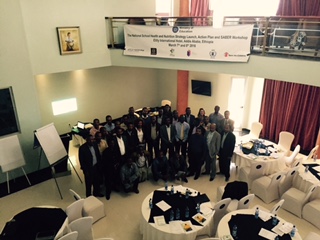
Policy makers from the Ministries of Education and Health undertook a two day Systems Approach for Better Education Results (SABER) policy analysis to identify ways to strengthen the countries school health and nutrition policies and programmes.
SABER is a World Bank supported tool for analysing policies in countries. It is designed to map the current SHN situation and find gaps in policy and implementation.
Opened by Dr. Tilaye Gete, State Minister for General Education the workshop assessed government capacity in the four policy areas deemed essential for effective implementation of a national school health and nutrition strategy namely;
- Health-related school policies
- Safe learning environment
- Skill-based health education
- School-based health and nutrition services.
Speaking at the opening Dr Tilaye Gete said, ‘SABER will be a good instrument for my Ministry to assess the school health and nutrition situation and systems in the country. Using this we will be able to identify the gaps and plan appropriate capacity development road maps with stakeholders for an effective implementation of our national SHN strategy.’
The school health SABER, convened by the Partnership for Child Development with the support of Dubai Cares, builds on a School Feeding SABER workshop that was held in August 2015 by the World Food Programme (WFP) and the Partnership for Child Development (PCD), Imperial College London.
The analysis from this workshop demonstrated the strong status of school feeding, being included in several policy documents, and highlighted the need for increased capacity and coordination, as well as requirements for well designed, evidence based school feeding programme.
It is hoped that the results of the follow up SABER School Health workshop will provide the Government’s School Health and Nutrition task force with a road map for planning and addressing the school health and nutrition agenda in Ethiopia.

